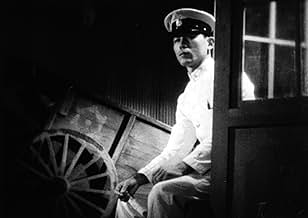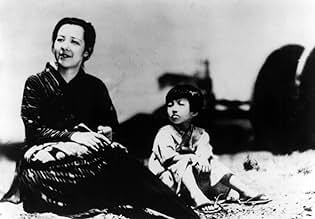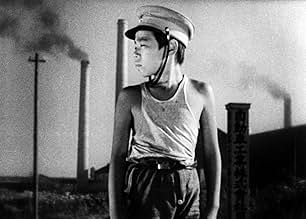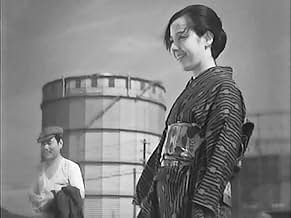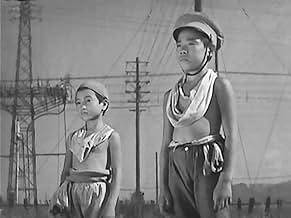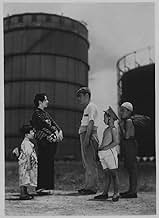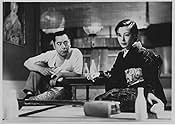IMDb-BEWERTUNG
7,4/10
1765
IHRE BEWERTUNG
Füge eine Handlung in deiner Sprache hinzuUnemployed Kihachi and his two sons struggle to make ends meet. But that doesn't keep Kihachi from wooing single mother Otaka.Unemployed Kihachi and his two sons struggle to make ends meet. But that doesn't keep Kihachi from wooing single mother Otaka.Unemployed Kihachi and his two sons struggle to make ends meet. But that doesn't keep Kihachi from wooing single mother Otaka.
- Regie
- Drehbuch
- Hauptbesetzung
Empfohlene Bewertungen
10kerpan
I would argue that "Tokyo no yado" (Inn at Tokyo) is not only one of Ozu's best films, but one of the best films by anyone ever. It tells the story of an unemployed and homeless single father (Takeshi Sakamoto) with two sons (the elder of the two being the wonderful Tomio Aoki) looking for work in depression-era Tokyo, whose lives intersects with those of a single mother (the marvelous Yoshiko Okada) of a little daughter likewise forlornly seeking a way (and a place) to live. The children can find moments of happiness in the undustrial wasteland -- and their parents can briefly recollect their own happiness as children. The boys have a brief idyll, after their father gets a job with the help of an old friend (Choko Iida), even getting to go to school (a pleasure they value almost as much as having a fixed home and a dependable supply of food). Things, however, become troubled again when the family loses track of the mother and girl (who have not found any "angel" to help them out). A film that is strikingly beautiful -- and more than a little heart-breaking. It is marred by a tiny section that seems overly melodramatic right before the end (but this might be due to infelicities of the intertitles -- or at least of their translation).
This film deals with an unemployed man and his two sons who rover through the industrial areas of Tokyo during the depression in the search for work.
After some bad luck the father is able to find a job but then the pity for a single mother and her sick little daughter makes him do something he should not have done.
This is the very simple story but this is not what makes the film a masterpiece. The great achievement is that Ozu shows how poverty affects the human mind. He depicts the fear and the feeling of senselessness in a way that nobody else has ever done. Many of the devices him employs are very imaginative. Many people might compare this film to de Sica's "Ladri di biciclette" which was made 12 years later. But without doing a disservice to de Sica's masterpiece: "Tokyo no yado" is the best film that was ever made about poverty and unemployment,
After some bad luck the father is able to find a job but then the pity for a single mother and her sick little daughter makes him do something he should not have done.
This is the very simple story but this is not what makes the film a masterpiece. The great achievement is that Ozu shows how poverty affects the human mind. He depicts the fear and the feeling of senselessness in a way that nobody else has ever done. Many of the devices him employs are very imaginative. Many people might compare this film to de Sica's "Ladri di biciclette" which was made 12 years later. But without doing a disservice to de Sica's masterpiece: "Tokyo no yado" is the best film that was ever made about poverty and unemployment,
A classic exercise for one with writers block is to pick a location, then build a story around it. I haven't read anything to suggest Ozu was suffering from writers block at the time, but that is the way much of 'An Inn in Tokyo' plays out, with a good two thirds of the story occurring in the empty fields outside factories. The fields are bare bar for unkempt shin high grass, and old bits of machinery, mostly performing the role of seats, strewn about, with towers and cranes and billowing smoke always looming in the background - a symbol of dirty prosperity amongst the otherwise barren landscape. And who does Ozu put in these fields? Why a father and two sons of course, which will come as no surprise to anyone familiar with his other silent work - it seems to be his special subject. The story plays out like a groundhog day - the man and his sons have no money, and wander the fields from factory to factory looking for work, filling their time between rejections by sitting in the fields and having the same conversations as the previous day - different variations of, 'Are you hungry?" What little money they do have, his sons blow on buying a nice hat they saw another boy with, before losing their fathers rucksack. It all looks nigh on hopeless before a chance encounter with a past friend at an inn in Tokyo finds him some work, and offers a floor to sleep on. They befriend a fellow jobless woman and her daughter, unselfishly sharing food with them, before the story takes a dramatic and heartbreaking (albeit not unpredictable) turn when the daughter gets sick, and the question of all adults are begged - what are you prepared to do for the sake of your children, and what is the cost?
It is a typically humble, family driven film from Ozu, where all characters are flawed, yet viewed with a sympathetic eye for the difficulties they face. Such is the down to Earth quality of the film (even Ozu's camera placements are 'down to Earth') that 'entertainment' hardly feels like an apt description, which is both a gift and a disservice. A gift in that it doesn't feel too showy or trivial, and a disservice in that it is a touch lackluster. Ozu's best silent work ('I Was Born But', 'Passing Fancy') contain similar themes in the same style, yet manage to entertain thanks to humour and charm. Those moments are not totally absent here, just more subdued. While the low key repetitiveness of the first act will threaten to turn some viewers away, it ultimately gives the drama of the final act greater impact, and the film is better for it. It is definitely one for those who like their films depressing, but makes a fine entry in the genre, and is preferable to Ozu's earlier, melodramatic silent 'A Story of Floating Weeds'. 6.5/10
It is a typically humble, family driven film from Ozu, where all characters are flawed, yet viewed with a sympathetic eye for the difficulties they face. Such is the down to Earth quality of the film (even Ozu's camera placements are 'down to Earth') that 'entertainment' hardly feels like an apt description, which is both a gift and a disservice. A gift in that it doesn't feel too showy or trivial, and a disservice in that it is a touch lackluster. Ozu's best silent work ('I Was Born But', 'Passing Fancy') contain similar themes in the same style, yet manage to entertain thanks to humour and charm. Those moments are not totally absent here, just more subdued. While the low key repetitiveness of the first act will threaten to turn some viewers away, it ultimately gives the drama of the final act greater impact, and the film is better for it. It is definitely one for those who like their films depressing, but makes a fine entry in the genre, and is preferable to Ozu's earlier, melodramatic silent 'A Story of Floating Weeds'. 6.5/10
10mgmax
The richly moving story of a hard-luck father and his two children, this masterpiece of unadorned realism may remind you more of Italian films like Shoeshine than Ozu's more staid work of the 50s. (The inspiration was probably Vidor's The Crowd, and a comparison with that masterpiece is by no means out of order.)
This is a silent film by Ozu, and it is brilliant both in its simple telling of the story and its development of the characters. This film is about a father, Kihachi, who has two small sons and is looking for work, so they can eat. He meets a young mother with a daughter and for a while she is out of the film. Near the end of his rope, he runs into an old female friend, who finds work for him and enables the boys to go to school. The young mother has come to the town with her daughter and he looks to help her, but is also interested in her. As simple as this sounds, the film is wrought with emotion, and is brilliant in that your own thoughts could be somewhat mixed about this. Shouldn't he be more grateful to the (female) friend who helped him find work? One of Ozu's best qualities is to show sadness, happiness and fear in its most basic, raw forms. The acting, even by the children, is uniformly wonderful. Even Mr. Ryu, whom I believe to be one of the greatest if not the greatest character actors in film history, is in this film in a small role. Ozu's films are methodically slow moving mostly, this one included, but I have always felt that prospective film makers should study his work to understand the virtues of simplicity in telling a story on film. Up there with Ozu's best. Possibly not as good as "Tokyo Story" and "Late Spring" but very highly recommended.
Wusstest du schon
- WissenswertesThe credits indicate that the script was based on an original work by a foreign writer with a name that sounds like "Winzart Monet", but it is actually a gag name, derived from "without money".
- VerbindungenFeatured in A Story of Children and Film (2013)
Top-Auswahl
Melde dich zum Bewerten an und greife auf die Watchlist für personalisierte Empfehlungen zu.
Details
- Laufzeit1 Stunde 19 Minuten
- Farbe
- Sound-Mix
- Seitenverhältnis
- 1.37 : 1
Zu dieser Seite beitragen
Bearbeitung vorschlagen oder fehlenden Inhalt hinzufügen

Oberste Lücke
By what name was Eine Herberge in Tokio (1935) officially released in India in English?
Antwort
